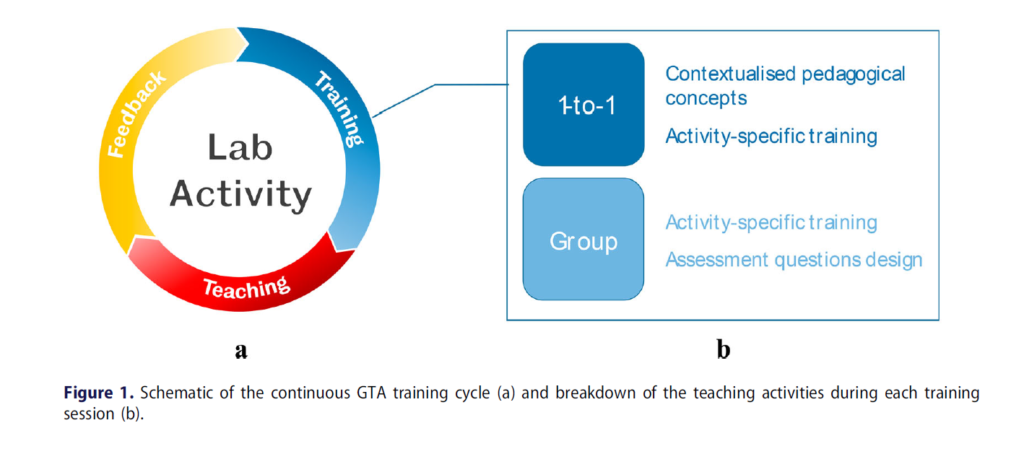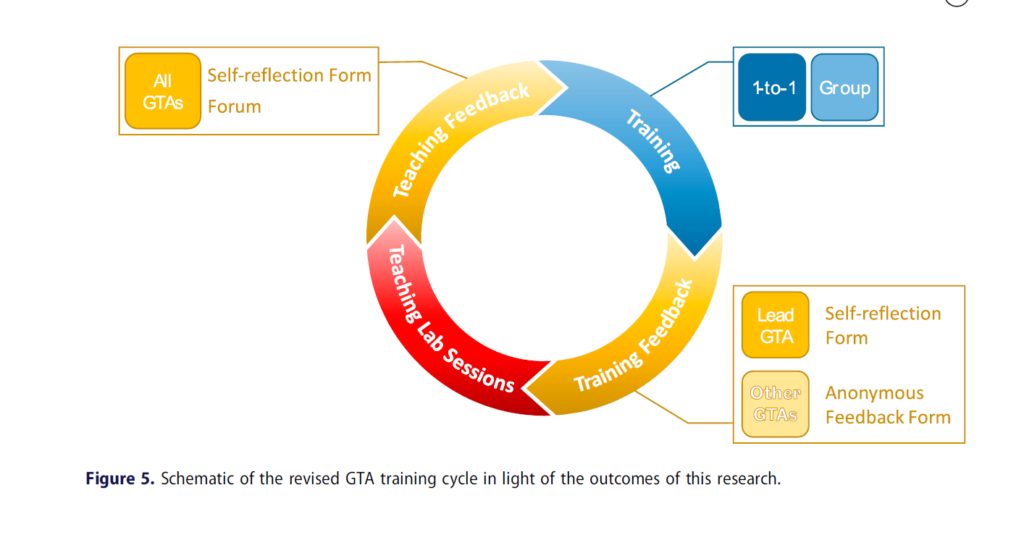Venue/Time: 19 June 2024, University of Sheffield
Network: AdvanceHE_GTA Developers Network
Who: Dangeni, Professional Development Adviser, LTDS and
Minki Sung, Postgraduate who Teach, HaSS
Graduate students frequently act as instructors for labs and lead seminar discussions while juggling significant research and academic duties. This dual role places graduate teaching assistants (GTAs), or Postgraduates who Teach at Newcastle University, in a unique position. The Academic Practice Team at LTDS provides essential training and community support through various routes:
This blended learning programme offers those with little to no teaching experience an opportunity to explore key concepts and issues in Higher Education teaching. It aims to equip participants with the practical skills and knowledge necessary to begin teaching and supporting learning at Newcastle University with confidence and enthusiasm.
This pathway, accredited by Advance HE, leads to recognition as an Associate Fellow of the HEA (AFHEA). It is designed for Postgraduates Who Teach (PGRwT) at Newcastle University who want to develop their early teaching careers in Higher Education. The syllabus and assessments are based on standards set by Advance HE, focusing on the professional practice of teaching and supporting learning as described in the Professional Standards Framework (PSF).
An online communication platform has been developed since 2023 to allow PgRs who Teach to continue engaging with teaching practices. This initiative emerged from the anticipation that micro-teaching sessions could focus on sharing PhD research and provide opportunities for those interested in further developing their teaching skills after completing the ILTHE and ELTS pathway.
Following last year’s discussion at the Advance HE GTA Network event at the University of Manchester, this year the community continued these discussions at the University of Sheffield on June 19th. The event aimed to champion the voice of GTAs, sharing ideas, resources, and educational development practices across the sector. The day featured three main themes: developing teaching competencies, inclusion and its relationship to GTA work, and institutional approaches to GTA development, with speakers from UK institutions sharing effective practices and case studies.
Case 1: Effective Use of Peer Teaching and Self-Reflection for Pedagogical Training
A notable example from colleagues at the University of Sheffield highlighted a training method for GTAs teaching in engineering laboratories. This training, based on session-specific content and contextualized pedagogical material, emphasized self-reflection and peer teaching.

It included individual and group sessions where GTAs could practice before engaging in real teaching, building their confidence, supporting self-reflection, and developing student-centered teaching skills. By comparing their training perceptions with their teaching assessments and feedback, the programme demonstrated its effectiveness.

These figures are from Di Benedetti, M., Plumb, S., & Beck, S. B. M. (2022). Effective use of peer teaching and self-reflection for the pedagogical training of graduate teaching assistants in engineering. European Journal of Engineering Education, 48(1), 59–74. https://doi.org/10.1080/03043797.2022.2054313
Case 2: Towards a Toolkit for Supporting GTA Teaching Identity
Colleagues from University of Glasgow shared another excellent example, a training model that supports GTAs in developing their teacher identity through best practice pedagogy, Brookfield’s lenses of reflection (see figure below), and graduate attributes has been considered and embedded. This model aims to enhance GTAs’ ability to engage with and confidently deliver active learning practices, thereby generating stronger learning experiences for undergraduate students.

This figure is from https://learningportfoliorichter.wordpress.com/2022/10/09/reflecting-on-myself-through-brookfields-four-lenses/
Case 3: Newcastle University GTA Community Building Chat
As the lead and convener of ILTHE and ELTS, as well as the creator of the community building chat, I invited Minki Sung, a PGRwT from HaSS, to co-present with me. The following section is taken from Minki’s reflection. It outlines his motivations, benefits, impact and areas for follow-up.
Motivations
After attending the introductory workshop, i.e., ILTHE and six ELTS sessions on applying for associate teaching fellowship, I decided to participate in the GTA community to enhance my current teaching practices.
Firstly, the motivation for joining the GTA community chat was that it didn’t require much time commitment. At that time, I had my PhD project, teaching responsibilities, and research assistant work for government projects. Secondly, there was no dedicated teaching community for PGRs who teach, except for the GTA community chat. By sharing some challenges and best practices with other TAs, I realized that I was not alone in struggling to increase student attendance. Thirdly, my previous experience as an educational military officer in my home country made the PGR demonstrator role familiar, but seminar-leading was quite new to me. Learning how other TAs lead their seminars and manage teaching difficulties was valuable.
Gains
A GTA community chat offers several advantages. It provides a platform to share teaching-related anxieties and concerns with minimal time commitment (one hour per month). It also facilitates the integration of research and teaching skills, broadening the understanding of different TA roles: PGR demonstrator, seminar leader, lab leader, and guest lecturer.
Personally, I learned the value of student interaction and understanding their different needs based on their learning stage. For example, Stage 1 students sometimes view their first year as a “party year,” which was surprising to me. Also, most students prefer visual and technological content over reading or seminar discussions. I am interested in exploring the access and using technological tools, although in my country, I would have to pay for these gadgets. Additionally, I was able to support and challenge students’ thinking using various case studies from my experiences in South Korea, China, Japan, and Vietnam, which was able to foster their critical thinking. Finally, I could pilot test some teaching ideas with other TAs and gain valuable feedback.
Impact of Community Engagement
The ELTS initially offered six workshops, providing a good starting point for PGRs assuming teaching roles in higher education. However, further development is necessary to share best practices and address challenges. For instance, at a recent sociology TA workshop, the lack of training after the ELTS workshop was highlighted. I suggested introducing a GTA community chat to gain practical experience together.
In summary, participating in this GTA community helped me understand my students’ needs and integrate my knowledge into their learning process effectively. This involvement also had a larger impact, as I connected with some PGR and PGT students in my seminars and labs, which helped me perform effectively as a school rep. Ultimately, many PGR colleagues and PGTs nominated me for School Rep of the Year, and I won the award.
Current Gaps and Challenges in Participating in the Community Chat
Advertisement and Participation
As a PGR school rep in the School of Architecture, Planning, and Landscape, I’ve observed similar challenges with participation between the PGR community cohorts and the GTA community chat. Some TAs hesitate to share difficulties, fearing it may be perceived as a weakness and jeopardize future TA opportunities. Additionally, disciplinary differences pose a challenge. Each discipline has its teaching requirements and TA recruitment practices.
Additionally, nurturing the GTA community chat may rely heavily on word-of-mouth within the PGR community. Utilizing networks established by PGRs who have completed ELTS workshops and achieved D1 certificates could enhance visibility and participation in the community chat. It needs to be advertised with a clear message that it will benefit any PGRs interested in teaching post-PhD.
Thank you for taking the time to read this GTA-themed blog post. Please get in touch at apt.lts@newcastle.ac.uk if you’d like to chat about our pathways and your practice!
